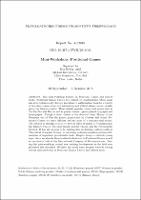Abstract
This mini-workshop focused on Positional Games and related fields. Positional Games Theory is a branch of Combinatorics whose main aim is to systematically develop an extensive mathematical basis for a variety of two-player games of perfect information and without chance moves, usually played on discrete objects. These include popular recreational games such as Tic-Tac-Toe and Hex as well as purely abstract games played on graphs and hypergraphs. Though a close relative of the classical Game Theory of von Neumann and of Nim-like games, popularized by Conway and others, Positional Games are quite different and are more of a combinatorial nature. The subject is strongly related to several other branches of Combinatorics like Ramsey Theory, Extremal Graph and Set Theory, and the Probabilistic Method. It has also proven to be instrumental in deriving central results in Theoretical Computer Science, in particular in derandomization and algorithmization of important probabilistic tools. Despite being a relatively young topic, there are already three textbooks dedicated to Positional Games as well

